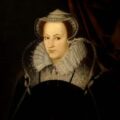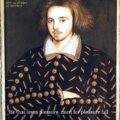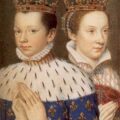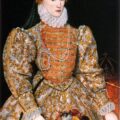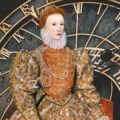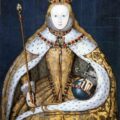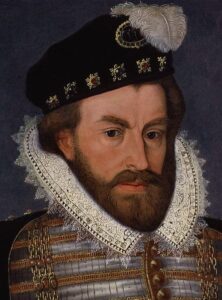
Sir Christopher Hatton, the man Elizabeth I nicknamed her “mouton” (sheep), was born in 1540. He was the son of William Hatton of Holdenby, Northamptonshire, and his wife, Alice Saunders, and was educated at St Mary Hall, Oxford.
Here is a list of offices he held, jobs he undertook and events he was involved in during the reign of Elizabeth I:-
- 1564 – Became one of Elizabeth’s gentlemen pensioners
- 1569 – Justice of the Peace, Northamptonshire
- 1571 – Member of Parliament
- 1571 – Constable of Corfe Castle
- 1571 – Clerk of council of duchy of Lancaster
- 1572 – Steward of the Manor of Wellingborough
- 1572 – Steward of Higham Ferrers and Daventry
- 1572 – Keeper of Eltham park, Kent and of Horne park, Surrey
- 1579 – Justice of the Peace for Dorset, Kent, Leicestershire, Middlesex, Warwickshire
- 1572 – Captain of the Queen’s bodyguard
- 1572 – Appointed to the conference with the Lords in May 1572 on ‘the great matter touching the Queen of Scots’
- 1576 Parliament – Appointed to committees concerning the subsidy, ports, the coinage, reciprocal treatment of foreigners, letters patent, fraudulent conveyances made by the northern rebels, the dean and chapter of Norwich, fines and recoveries, private bills, justices of the forests, excess of apparel, the Queen’s marriage, Lord Stourton’s bill and wharves and quays
- 1576 – Appointed to examine the Puritan Peter Wentworth
- 1578 – Vice-chamberlain of the Royal Household and member of the Privy Council
- 1578 – Knighted
- 1578 – Receiver of first fruits and tenths
- 1578 – Queen’s spokesman in the House of Commons
- 1578 – Involved in prosecuting John Stubbs, the man who had his right hand cut off for writing the pamphlet “The Discovery of a Gaping Gulf whereunto England is like to be swallowed by another French Marriage, if the Lord forbig not the banns, by letting her Majesty see the sin and punishment thereof”, and his publisher, William Page.
- 1581 – Involved in trying to arrange a marriage between Elizabeth and the Duke of Alençon
- 28th November 1584 – Government spokesman, spoke on the danger of Spain for over 2 hours
- 1584 – Involved in the examination and trial of William Parry (the Parry plot
- 1584 – Mary Queen of Scots claimed that Hatton was Elizabeth’s lover
- December 1584 – Led a prayer in the House of Commons for Elizabeth’s safety after it was rumoured that he was close to Mary Queen of Scots
- 1586 – Involved in trying Anthony Babington
- 1586 – A member of the commission who found Mary Queen of Scots guilty
- 1586 – Lord Lieutenant, Northamptonshire
- 1587 – Hatton was one of those who urged William Davison to send Mary Queen of Scots’ death warrant to Fotheringhay
- March, 1587 – Made the leading speech for the government against ‘the bill and the book exhibited in the Parliament… for a further reformation of the church’
- 1587 – Made Lord Chancellor
- 1588 – Chancellor of the University of Oxford
- 1590 – High Steward, Salisbury
Sir Christopher Hatton died on the 20th November 1591 at Ely Palace in London. He had been ill for some time and Elizabeth I had visited him on the 11th November. He was given a state funeral on 16th December at the old St Paul’s Cathedral and a monument was erected at the high altar. The old St Paul’s Cathedral was destroyed in the Great Fire of London in 1666.
Sir Christopher Hatton Trivia
- Hatton was considered handsome
- He never married but had an illegitimate daughter, Elizabeth, a woman made famous by the Bleeding Heart legend – click here.
- He was a Knight of the Garter
- As well as being the Chancellor of Oxford University, he was also High Steward of Cambridge University
- Between 1564 and 1587 he was such a favourite that he saw the Queen most days and the longest he was ever away from court was one week
- Hatton opposed the French marriage
- He was involved in the examination of the Duke of Norfolk
- Hatton was debt ridden from 1575 onwards and died with debts of over £40,000
- He frequently acted as Elizabeth’s spokesman
- He was conservative in religion and was a supporter of John Whitgift, Archbishop of Canterbury
- He came to live in Ely Palace, the London residence of the Bishops of Ely, after Elizabeth forced the bishops to grant him a lease for the rent of a red rose, ten loads of hay, and ten pounds, the right to walk in thegardens whenever they chose, and to gather twenty baskets of roses every year.
- He borrowed money from the Queen for improvements to his home and was unable to pay her back.
- Elizabeth I called him her “mouton”.

